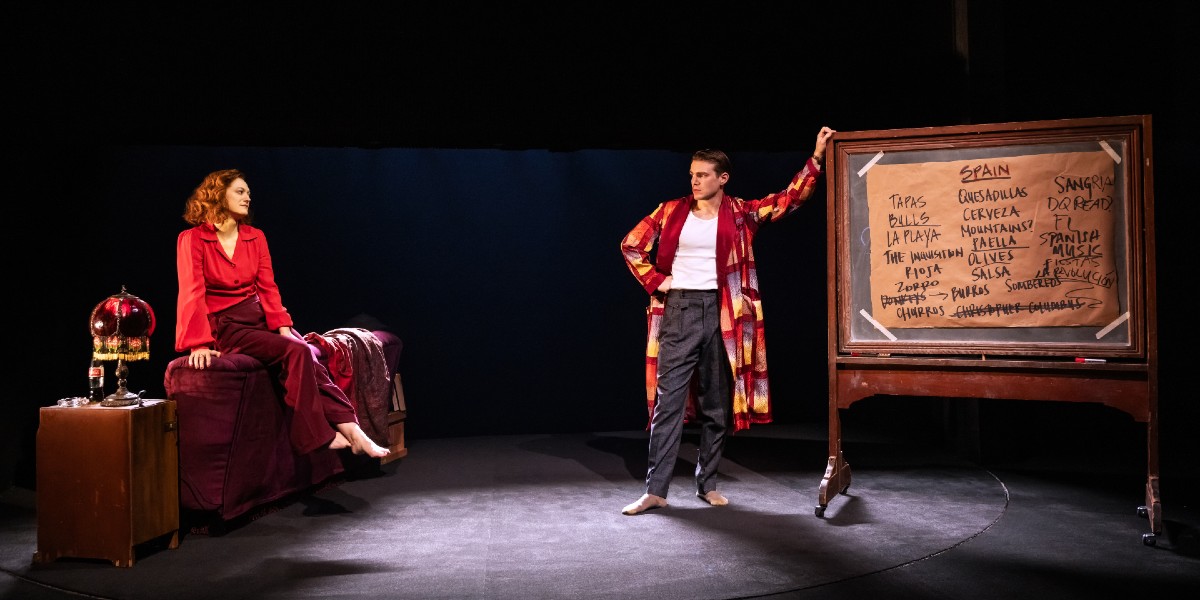Read our four-star review of Spain off Broadway, a play written by Jen Silverman and directed by Tyne Rafaeli, at Second Stage Theater’s Tony Kiser Theater.
Jen Silverman’s Spain strikes early laughs when documentary filmmaker Joris Ivens (a frenetic Andrew Burnap) tells us – with a straight face – he is speaking in a Dutch accent. No, he’s not. It’s an early sign this play does not aim for factuality. Spain isn’t a historical play about the making of the propaganda documentary The Spanish Earth; rather, it’s about distortion and inflation inherent in making “informational” art.
Tyne Rafaeli’s direction hews more Hollywood noir than naturalism, the set darkened by Dane Laffrey’s scenic design, sculpted in harsh shadows by Jen Schriever’s lighting, and underscored by Daniel Kluger’s thrumming music, which unravels the play like a thriller.
It’s a smart choice that ensnares Spain within the storytelling strategies tossed between the players. The year is 1936, and Joris received a proposition from the Soviet’s propaganda bureau: Craft a film in favor of the Spanish working class to persuade American sympathies and encourage donations to Spanish communists.
Joris and his girlfriend, fellow filmmaker Helen (Marin Ireland, in a go-for-broke performance), put their heads together and relay their progress to Soviet agent Karl (Zachary James, as towering as he was in the Met Opera’s Akhnaten), a frightening figure cloaked in shadow.
Silverman’s text deliberately evades specifics about the historical context of the Spanish Civil War, other than how the KBG wants to frame it and how the recruited artmakers follow suit. Joris confesses little investment in the cause (“I love the working class in theory,” he admits), but he covets the artistic opportunity to forge something beautiful — and longer than his standard 15 minutes.
The pair also acquire A-list author Ernest Hemingway (Danny Wolohan) as a screenwriter, his brevity unmatched. To fill in the gaps, they also recruit John Dos Passos (Erik Lochtefeld), a writer with more knowledge of Spain, but a red flag for the KBG due to his affinity for “thinking.” Spain milks riches from this feud between the former pals, theirs a war of Hemingway’s soundbites-and-slogans versus Passos’s introspection.
However, Silverman primarily emphasizes the rapport between Passos and Helen, the latter of whom is disillusioned with her involvement in the film. Silverman uses Helen to explore the entanglements of artistic integrity, ownership, and ethics in ever-shifting contexts. If you don’t technically own the art, how much of your vision trickles into the final product? How can you give it staying power in audiences’ minds?
Shaped by the KBG’s political intents, Joris and Helen’s cause is romanticized and simplified into “a war between the rich and the poor.” When they brainstorm storytelling shots, they can only dream up touristy symbols of Spain: Don Quixote, bulls, and guitars. They reduce the place to a metaphor they can shape.
In the play’s final minutes, Silverman builds Spain into a quasi-opera, a medium similarly notorious for exoticizing its settings. James unleashes two full-throated arias, the first an unexpected visual shorthand and the last a final thought bestowed upon the audience.
Spain makes a final jolt into modern times that doesn’t quite land, but it’s a commendable swing that shows how propaganda has evolved — and yet, hasn’t changed much. As the final aria insists, theatricality is a universal tool of persuasion. You’re so seduced, you may not notice you’re implicated, too.
Spain is at the Tony Kiser Theater through December 17. Get Spain tickets on New York Theatre Guide.
Photo credit: Marin Ireland and Andrew Burnap in Spain. (Photo by Matthew Murphy)

